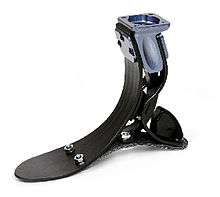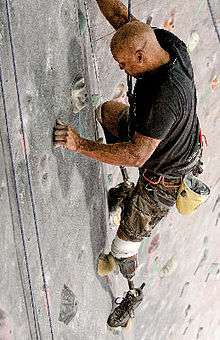College Park Industries
College Park Industries[1] is a prosthetics manufacturer headquartered in Warren, Michigan. The company was founded in 1988 after a local machinist set out to create the world’s most anatomically correct prosthetic foot.[2]
 | |
| Founded | Warren, Michigan (8 July 1988) |
|---|---|
| Headquarters | |
| Products | prosthetic, artificial limbs |
| Website | www.college-park.com |


College Park’s first product was the Trustep® foot,[3] which mimics the anatomical movement of a foot by replicating the bones and tendons through composites, bumpers and bushings. Since the release of the Trustep®, College Park has gone on to design and develop many other innovative prosthetic feet that utilize their proprietary Intelliweave™[4] composites. These include the Truper®, the first multi-axial pediatric foot; the Soleus®,[5] which was the first to incorporate Integrated Spring Technology (iST™);[6] the heel-height adjustable Accent® foot; and the Odyssey® K2 & Odyssey® K3 feet which have a patented curved hydraulic ankle. College Park also manufacturers other prosthetic products, including endoskeleton components, liners, and sleeves. The company is ISO 13485 certified and sells its products worldwide. In 2015, College Park acquired Liberating Technologies, Inc.,[7] an upper-limb prosthetics company.
References
- "Healthcare Case Study: College Park Industries". Archived from the original on 2016-03-29. Retrieved 2016-03-21.
- About College Park Industries' History
- Clinical Evaluation of an Articulated, Dynamic-Response Prosthetic Foot in Teenage Transtibial and Syme-Level Amputees
- Trademark Electronic Search System (TESS) - Intelliweave
- The Prosthetic Foot That's Helping Paralympic Athletes To Compete
- Integrated Spring Technology (iST™)
- College Park acquired Liberating Technologies, Inc.
External links
- Official website
- Espire Elbow
- Anatomical Trustep Movement
- Marine Vet Aims for 2018 Paralympic Winter Games
- College Park Case Study
- Designing replacements for human limbs
- Clinical Prescription and Use of Prosthetic Foot and Ankle Mechanisms: A Review of the Literature